
Jovis Vicilini
b. 300 B.C. ?
( Iovi, Jove, Jupiter, Juppiter, Vicilinus, Visilini, Visilinus )
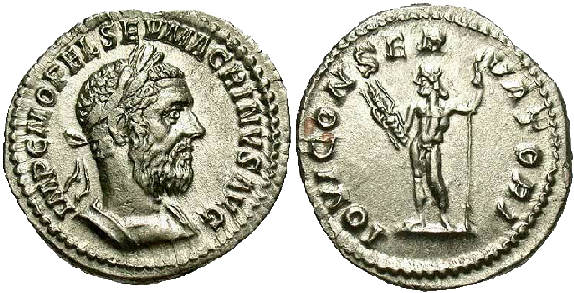
Denarius of Macrinus (217-218)
IMP C M OPEL SEV MACRINVS AVG
IOVI CONSER_VATORI

n the reverse side of a denarius of the Roman Emperor Macrinus stands a nude Jupiter holding a thunderbolt in his right hand and a scepter in his left. The inscription on the reverse reads IOVI CONSERVATORI.(1) �
Sestertius of Trajan (115 AD)
IMP CAES TRAIANO OPTIMO AVG GER DAC P M TR P COS VI P P
CONSERVATORI PATRIS PATRIAE SC
Likewise, on the reverse side of an orichalcum sestertius of the Roman Emperor Trajan stands a nude Jupiter with his right arm extended while holding his cloak out in protection of the Emperor Trajan who stands below him. The inscription on the reverse reads CONSERVATORI PATRIS PATRIAE.(2) �
|
CONSERVATORI PATRIS PATRIAE � Jupiter standing to the left, a large cloak pendent from his shoulders; his right hand extended holds one side of the cloak spread out as a protection to the emperor, who is robed and stands on the right side of Jupiter, and holds up his right hand as if addressing some persons, or in token of thanks for protection afforded. � Domitian had great reverence for Jupiter Conservator, and erected a temple to him. (Hobler, Records of Roman History, Volume 1, p. 265.) (3) � |
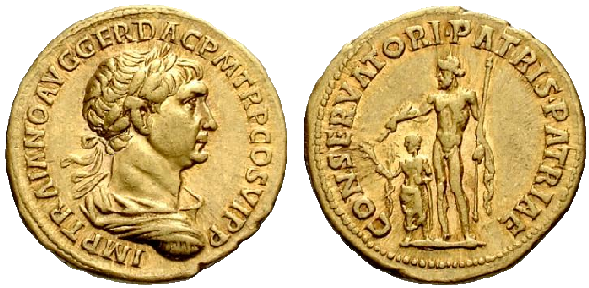
Aureus of Trajan (98-117)
IMP TRAIANO AVG GER DAC P M TR P COS VI P P
CONSERVATORI PATRIS PATRIAE
On a gold aureus of the Roman Emperor Trajan stands a nude Jupiter holding a thunderbolt in his right hand and a scepter in his left as he protects Trajan who stands below him. Once again, the inscription on the reverse reads CONSERVATORI PATRIS PATRIAE.(4) �
|
The diminutive figure of the Emperor, contrasting with the size of the god, indicates their respective importance. Most coins bear the legend Conservatori patris patriae, i.e., to the preserver of the father of the fatherland. (Dvornik, Early Christian and Byzantine Political Philosophy, p. 504.) (5) � |
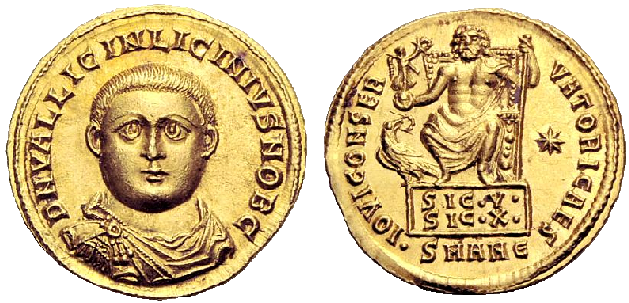
Aureus of Licinius II. (317-324)
D N VAL LICIN LICINIVS NOB C
IOVI CONSER_VATORI CAES
And a gold aureus of the Roman Emperor Licinius II displays an exceptional image of Jupiter enthroned. He is seated facing forward, enthroned on a platform, holding Victory on a globe in his right hand and a scepter in his left. In the left field beside him is an eagle with a wreath in its beak and in the right field a star. Here, the inscription on the reverse reads IOVI CONSERVATORI CAES, meaning Jupiter Protector of Caesar.(6)(7) � � �
|
Even when the Sun is beginning to conquer the Roman world we do well to remember that Jupiter remains for many the great god of Rome. We see him on an aureus of Septimius Severus, naked save for a cloth over his left shoulder, with a scepter in his left hand, clasping the hand of the emperor, in military uniform, with his right. On another he is seated, holding out a Victory on a globe in his right hand, with an eagle before him; the inscription is to Jupiter the Protector, IOVI CONSER. Elsewhere he is called Jupiter Victor, or Unconquerable (INVICTVS), bearing the epithet which became the particular prerogative of the Sun. Under Caracalla we see him advancing with thunderbolt at the ready; here he is Jupiter the Defender, IOVI PROPVGNATORI. Macrinus honours Jupiter the Protector, whom we see sheltering him as he stands at the god�s feet. Even Elagabalus does not wholly oust Jupiter from the coins; the god appears seated, with his eagle, holding out Victory. Jupiter, Mars and Sol are the three most prominent deities in the coinage of Severus Alexander; Jupiter appears as Conservator (Protector), Propugnator (Defender), Stator (Supporter) � Maximus and Balbinus � were careful to put themselves under the protection of Jupiter by offering sacrifices in the Capitol, and their coinage naturally gives prominence to Jupiter Conservator. (Ferguson, The Religions of the Roman Empire, p. 41-42. )(8) � |
Quickly, through this brief study of Roman coins, with their images so well preserved, we discover a number of interrelated epithets assigned by the Romans to Jupiter. The title IOVI CONSERVATORI indicates Divine Providence, meaning that as Conservator Jupiter would have been hailed as the Preserver, Protector, Guardian and Keeper(9) of his people.
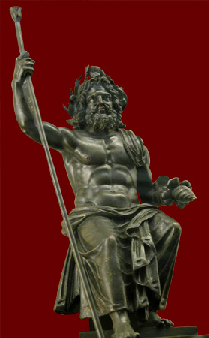 Roman Bronze Statuette of Jupiter |
But, of course, this idea of Divine Providence is not merely expressed through inscriptions on Roman coins; nor is it solely limited to the expressions IOVI CONSERVATORI and IOVI PROPVGNATORI. Instead, we discover a number of bynames that the Romans once ascribed to the mighty Jupiter. There is one that is of primary importance to our research. It is to be found in the writings of Titus Livius.(10) In the 24th book of his quite famous History of Rome(11), Livy describes for us a battle that takes place in the year 213 BC. Here he writes et in Jovis Vicilini templo, quod in Compsano agro est, arma concrepuisse(12)(13) ( � a clashing of arms was heard in the temple of Jupiter Vicilinus in the neighbourhood of Compsa � Liv. 24, 44, 8.)(14) |
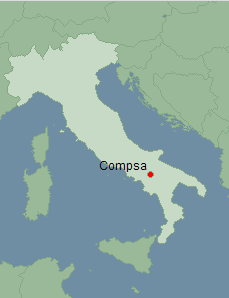 |
|
Livy mentions incidentally a temple �in agro Compsano,� dedicated to Jupiter Vicilinus, an epithet otherwise unknown (xxiv.44). According to a local antiquary, some remains of it were still visible at a spot named Voghino in the neighbourhood of Conza. (Smith, Dictionary of Greek and Roman Geography, p. 652.)(15) � � |
Latin-German dictionaries translate Vicilini as der Wachsame; while Latin-English dictionaries translate it as the Vigilant or the Watchful One. In addition, we are told that it serves as a byword, byname, surname or epiteth of Jupiter:
|
Vicilinus, i. m. (wahrsch. von vigil), der Wachsame, Juppiter Vicilinus, Liv. 24, 44, 8. (Georges, Ausf�hrliches Lateinisch-Deutsches Handw�rterbuch, p. 2050.)(16) � Vicilinus, i, m. (viell. von vigil), der Wachsame, Beiwort des Jupiter, Liv. 24, 44, 8. (Freund, W�rterbuch der Lateinischen Sprache, p. 970.)(17) � Vicilinus, i. m. ein Beiname des Juppiter, Liv. 24, 44 (al. Visilini). (Georges, Lateinisch-Deutsches und Deutsch-Lateinisches Handw�rterbuch, p. 1863.)(18) � Vicilinus, i. m. The Vigilant, a surname of Jupiter, Liv. 24, 44, 8. (Riddle, A Copious and Critical Latin-English Lexicon, p. 1350.)(19) (Anthon, A Latin-English and English-Latin Dictionary, p. 395.)(20)� Vicilinus, -i. m. (perhaps from vigil), the watchful one, Juppiter Vicilinus, Liv. (Marchant, Cassell's Latin Dictionary, p. 617.)(21) � Vicilinus, i. m. vigil, the Watchful, the Vigilant, an epithet of Jupiter, Liv. 24.44.8. (Lewis and Short, A Latin Dictionary.)(22) � |
Surely it is quite apparent that Jupiter Vicilinus is a title relatively synonymous with IOVI CONSERVATORI. The watchfulness of Jupiter is an inseparable attribute of Divine Providence, where the act of watching is inherent in the act of protecting. The idea that Jupiter watches over his people is certainly basic to Roman ideology. Thus we find it fully expressed in classical Roman literature. We have only to turn to Virgil�s Aeneid, where Virgil speaks to the audience of his age:
|
Panditur interea domus omnipotentis Olympi, (Pitt, The Works of Virgil, Volume 4, pp. 84�87.)(23) �
Omnipotent Olympus sees the while (Miller, The Aeneid of Virgil in English Blank Verse, Volume 2, pp. 369-370.)(24) �
Jetzt wird ge�ffnet das Haus des allmachtvollen Olympus, (Vo�, Vergils �neis, Chapter 20.)(25) �
Indessen sind die allmachtvollen Hallen (Lots, Virgil's Aeneide, p. 344.)(26) � |
The first German example translates into English as �He allows the eyes upon the earth to fall�. And the second becomes �[from] where [on] high, upon the countries of the world � he looks�. Thus Virgil clearly states that Jupiter watches down upon the nations so as to perform his role as Conservator or Overseer(27) of mankind. He sits above in his starry abode from whence he judges the acts of gods and men:
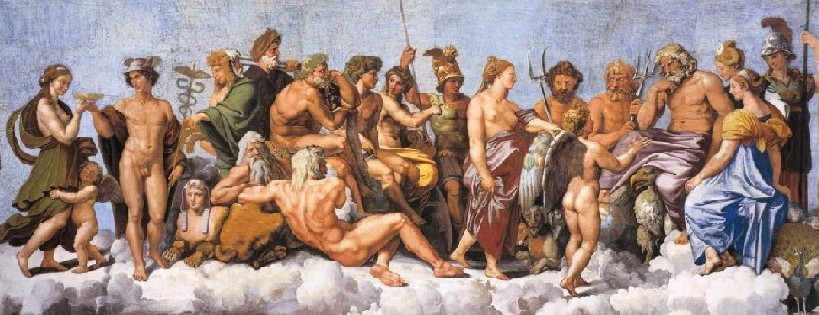
The Council of the Gods(28)
Raphael
1515-1517 AD
|
Jupiter, in a council of the Gods, disapproves of what has been done to excite the war, and desires that there be no further intervention: but finding Juno vehement and unchanged, declares his own impartiality in the contest, and that the several destinies of the belligerents shall remain undisturbed. (Miller, The Aeneid of Virgil in English Blank Verse, Volume 2, p. 369.) (24) � Juppiter schw�rt, nachdem er Venus und Juno umsonst zur Friedfertigkeit ermahnt hat, da� er ohne Teilnahme den Krieg dem Schicksal �berlasse. (Vo�, Vergils �neis, Chapter 20.) (25) � |
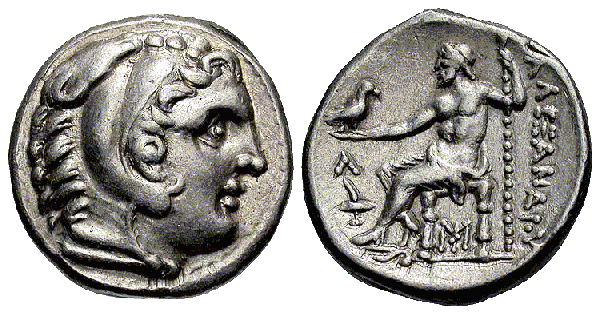
Tetradrachm of Alexander the Great. (336-323 BC)(29)
with Zeus Seated on His Throne
Certainly, Virgil is known to have borrowed extensively from the Greeks. In this exchange, the Roman Jupiter is identical to the Greek Zeus; while the Roman Minerva is identical to the Greek Athena. So among the Greeks, we discover very familiar storylines. Thus, at the end of Homer�s Odyssey, Zeus decides to put an end to the fighting in the battle between the Greeks and the Trojans. With the hurling of a thunderbolt, he instructs his daughter Athena to intercede in the activities of Odysseus. She diverts him from seeking revenge upon the Trojans by acting as his Mentor and insisting that he bring an end to the fighting.:
|
"ἴσχεσθε πτολέμου, Ἰθακήσιοι, ἀργαλέοιο, (Homer, The Odyssey.) (30) � �Ithacans, stop this disastrous fight and separate at once before blood is shed.� (Rieu, The Odyssey, p. 351.)(31) � "Men of Ithaca," she cried, cease this dreadful war, and settle the matter at once without further bloodshed." (Butler, The Odyssey of Homer, p. 323.)(32) �
Also rief Athen�a: da fa�te sie bleiches Entsetzen. (Vo�, Homer's Werke: Homer's Odyssee, p. 278.)(34) � |
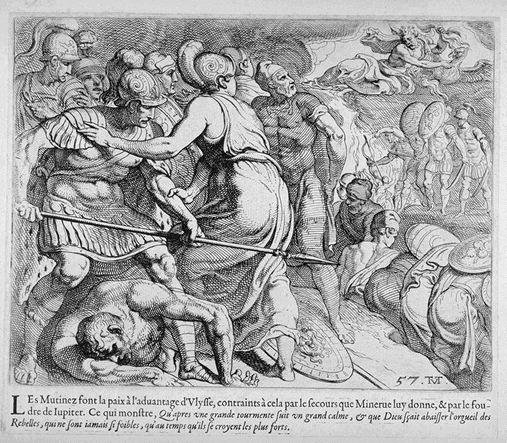
Athene and Zeus Stop the Fighting(34)
Etching by Theodor van Thulden (1606-1669)
Fine Arts Museum of San Francisco
In Livy, Virgil and Homer, the strife of mankind is under the oversight of the the wide-eyed(35), far-seeing(36) Zeus (εὐρύοπα Ζεύς). The German translates into English as �that wrath does not come upon you from the governing ruler of the world, Zeus.�(37)(38) So in Homer, as in Virgil, the watchfulness of Jupiter Vicilinus can also be seen as an important aspect of his role as Ruler or Governor of the world. Similarly, this theme of watchfullness is taken up even further in Hesiod�s Works and Days(39):
|
ὦ βασιλῆς, ὑμεῖς δὲ καταφράζεσθε καὶ αὐτοὶ (Hesiod, Works and Days, pp. 21�23.)(40) �
(ll. 248-264) You princes, mark well this punishment you also; for the deathless gods are near among men and mark all those who oppress their fellows with crooked judgments, and reck not the anger of the gods. For upon the bounteous earth Zeus has thrice ten thousand spirits, watchers of mortal men, and these keep watch on judgments and deeds of wrong as they roam, clothed in mist, all over the earth. And there is virgin Justice, the daughter of Zeus, who is honoured and reverenced among the gods who dwell on Olympus, and whenever anyone hurts her with lying slander, she sits beside her father, Zeus the son of Cronos, and tells him of men�s wicked heart, until the people pay for the mad folly of their princes who, evilly minded, pervert judgment and give sentence crookedly. Keep watch against this, you princes, and make straight your judgments, you who devour bribes; put crooked judgments altogether from your thoughts. (Evelyn-White, Hesiod, Homer, The Homeric Hymns and Homerica, pp. 21�23.)(42) �
Pr�fet jedoch auch ihr, o Herrscher, mit Ernst, wie des Rechtes (Gebhardt, Hesiod, Hesiodos, Werke und Tage.)(42) � |
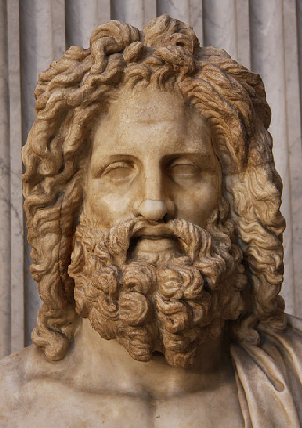 Roman Marble based on Greek Original of Zeus � |
Here Hesiod extends even further the meanings to be found in the name Jupiter Vicilinus. A translation of the German phrase �Wachsam stets durchschauet des Zeus allsehendes Auge� provides an interpretation that goes beyond the simple Latin-German definition der Wachsame; where the verb durchschauen suggests "to see through something, to figure something out". Thus the literal translation into English becomes �always watchful, the all-seeing eye of Zeus sees through�. This modifies ever so slightly "The eye of Zeus, seeing all and understanding all.� Seeing through is seeing completely. No secrets remain. Therefore, seeing all is the same as knowing all. This ancient idea of a vigilant, all-seeing and all-knowing god is found not only in Roman and Greek literature but echoes back to an earlier Indo-European tradition.(43)(44) But surely this idea finds its fullest illumination in the writings of the Greek Hesiod: |
|
Justice, however, is more than a social virtue between men; it is the chief attribute of Zeus, personified as his daughter and constant attendant: �Justice is the daughter of Zeus, glorified and honored by the gods who hold Olympus; and whenever anyone does her wrong with perverse blame, straightway she sits by Zeus, son of Cronos, and she tells him the thoughts of unjust men, that the people may pay for the folly of the princes who by their wrongful purposed and crooked speeches turn judgments from the right course.� In his work of defending justice Zeus is aided not only by his daughter, but by a host of watchful guardians, intermediaries who report mortals� deeds: �Thrice ten thousand are the immortal servants of Zeus upon the rich earth, who watch mortal men. Clad in mist they fare to and fro on the earth watching deeds of justice and wrongful acts.� Justice then never fails to bring sooner or later the due return to right and wrong actions; from her and the watchful messengers of Zeus there is no escape. The Homeric man had recognized that righteousness is better than evil and that the wicked are constantly threatened by punishment; but Hesiod in his Works and Days goes somewhat further than Homer, in that he makes justice a necessary attribute of the gods as well as men. (Moore, Religious Thought of the Greeks, p. 32.) (45) � |

Fall of the Giants(46)
Giulio Romano (1525-1535)
Palazzo del Te, Mantova, Italy
The Zeus of the Greeks became the Jupiter of the Romans. His oversight of mankind is fully apparent. His role as Conserver, Protector, Defender, Guardian, Keeper and Watcher are aspects of a singular nature. Jupiter, like Zeus, is All-Seeing and All-Knowing. He is the All-Wise Ruler and Judge of men. And so, in the name Jovis Vicilini, we must understand the multiple meanings that describe Divine Providence, where a Vigilant Jupiter is also the ultimate Conservator of humankind.



(1) |
Silver denarius of Macrinus (217-218). Indicating Jupiter as IOVI CONSERVATORI. Retrieved on August 6, 2012: � |
||
(2) |
Orichalcum sestertius of Trajan (115 AD). Indicating Jupiter as CONSERVATORI PATRIS PATRIAE. Retrieved on August 6, 2012: � |
||
(3) |
Hobler, Francis, Records of Roman History: From Cn�us Pompeius to Tiberius Constantinus, as Exhibited on the Roman Coins, Volume 1. Westminster: John Bowyer Nichols and Sons, 1860, p. 265. Retrieved from Google Books on August 6, 2012: � |
||
(4) |
Gold aureus of Trajan (98�117 AD). Indicating Jupiter as CONSERVATORI PATRIS PATRIAE. Retrieved on August 6, 2012: � |
||
(5) |
Dvornik, Francis, Early Christian and Byzantine Political Philosophy: Urigins and Background, Volume 2. Washington, D.C: Dumbarton Oaks Center for Byzantine Studies, trustees for Harvard University, 1966, p. 504. Retrieved from Google Books on August 6, 2012: � |
||
(6) |
Gold aureus of Licinius II (317-324 AD). Indicating Jupiter as IOVI CONSERVATORI CAES. Retrieved on August 6, 2012: � � |
||
(7) |
IOVI CONSERVATORI CAES: Jupiter Protector of Caesar. Retrieved on August 6, 2012: � |
||
(8) |
Ferguson, John, The Religions of the Roman Empire. Ithaca: Cornell University Press, 1985, p. 41-42. Retrieved from Google Books on August 6, 2012: � |
||
(9) |
Nugent, Thomas, New French-English (English-French) pronouncing dictionary, on the basis of Nugent, by a member of the University of Paris. London: William Tegg, 1875, p. 116. Retrieved from Google Books on August 6, 2012: � |
||
(10) |
Titus Livius, otherwise known as Livy, was born in 59 BC and died around 17 AD: see Magill, Frank N., Dictionary of World Biography: Volume 1: The Ancient World. Chicago: Fitzroy Dearborn, 2003, p. 668. Retrieved from Google Books on August 6, 2012: � |
||
(11) |
The Latin title, Ab Urbe Condita Libri, literally translates as "Books Since the City's Founding", but this series of books is most commonly known in English as The History of Rome. see Livy and Jaeger, Mary, A Livy Reader: Selections from Ab Urbe Condita, Mundelein: Bolchazy-Carducci Publishers, 2011, p. xi. Retrieved from Google Books on August 6, 2012: � |
||
(12) |
Livy, Ab Urbe Condita, Ex typographia Societatis Wuertembergicae, 1823, p. 803. Retrieved from Google Books on August 6, 2012: � |
||
(13) |
Livy and Weissenborn, W., ed., Ab Urbe Condita Libri, Volume 5. Berlin: Weidmann, 1871, p. 94. Retrieved from Google Books on August 6, 2012: � |
||
(14) |
Livy and Roberts, Rev. Canon, trans., The History of Rome, Vol. 3. London: J. M. Dent & Sons, Ltd., 1905. Retrieved on August 6, 2012: � |
||
(15) |
Smith, William, Dictionary of Greek and Roman Geography, illustrated by numerous engravings on wood.. London. Walton and Maberly, 1854, p. 652. Retrieved from Google Books on August 6, 2012: � � |
||
(16) |
Georges, Karl Ernst, Ausf�hrliches Lateinisch-Deutsches Handw�rterbuch: Aus den Quellen zusammengetragen und mit besonderer Bezugnahme auf Synonymik und Antiquit�ten unter Ber�cksichtigung der besten H�lfsmittel. K � Z,. Leipzig: Hahn, 1869, p. 2050. Retrieved from Google Books on August 6, 2012: � |
||
(17) |
Freund, Wilhelm, W�rterbuch der lateinischen Sprache nach historisch-genetischen Principien, mit steter Ber�cksichtigung der Grammatik, Synonymik und Alterthumskunde: nebst mehreren Beilagen linguistischen und arch�ologischen Inhalts. R - Z, Volume 4,. Leipzig: Hahn, 1840. p. 970. Retrieved from Google Books on August 7, 2012: � |
||
(18) |
Georges, Karl Ernst, Scheller, Immanuel J. G., and L�nemann, Georg Heinrich, Lateinisch-Deutsches und Deutsch-Lateinisches Handw�rterbuch. Leipzig: Hahn, 1838, p.1863. Retrieved from Google Books on August 7, 2012: � |
||
(19) |
Riddle, Joseph Esmond and Freund, William, A copious and critical Latin-English lexicon. London: Longman, Brown, Green, and Longmans, 1849, p. 1350. |
||
(20) |
Anthon, Charles, Freund, William, Kaltschmidt, Jacob Heinrich, and George, Karl Ernst A Latin-English and English-Latin dictionary: for the use of schools: chiefly from the lexicons of Freund, Georges, and Kaltschmidt. New York: Harper & Brothers, 1859, p. 395. Retrieved from Google Books on August 7, 2012: � |
||
(21) |
Marchant, James Robert Vernam and Charles, Joseph Fletcher, Cassell's Latin dictionary: (Latin-English and English-Latin). London: Cassell & Company, 1892, p. 617. Retrieved from Google Books on August 7, 2012: � |
||
(22) |
Lewis, Charlton T., and Short, Charles, A Latin Dictionary; Founded on Andrews' edition of Freund's Latin dictionary. Oxford: Clarendon Press, 1879. Retrieved from Perseus on August 7, 2012: � |
||
(23) |
The Aeneid is dated to between 29 and 19 BC. Pitt, Christopher, trans., The works of Virgil: in Latin & English. The Aeneid, Volume 4, London: J. Dodsley, 1778, pp. 84�87. Retrieved from Google Books on August 7, 2012: � |
||
(24) |
Miller, John, The Aeneid of Virgil in English Blank Verse, Volume 2, London: Macmillan and Co., 1863, pp. 369-370. Retrieved from Google Books on August 7, 2012: � |
||
(25) |
Vo�, Johann Heinrich, trans., Vergils �neis, Leipzig: Philipp Reclam jun., 1875. Retrieved from Projekt Gutenberg on August 7, 2012: � |
||
(26) |
Lots, P. E. L., trans. Virgil's Aeneide, Leipzig: Arnold. 1862. p. 344. Retrieved from Google Books on August 7, 2012: � |
||
(27) |
see: Estes, James Martin, Peace, Order And the Glory of God: Secular Authority and the Church in The Thought of Luther and Melanchthon, 1518-1559, Leiden: Brill, 2005, p. 50. Retrieved from Google Books on August 7, 2012: �
|
||
(28) |
"Council of the Gods" by Raphael (1515-1517 AD), from Impelluso, Lucia, Gods and Heroes in Art, Los Angeles: Getty Publications, 2002, pp. 142-143. � Retrieved from Claudiasensi on August 7, 2012: �
| ||
(29) |
Silver Tetradrachm of Alexander III the Great (336-323 BC) from the city of Amphipolis. On the obverse: Head of Hercules, as Alexander the Great, right clad in lion's skin; on the reverse: Zeus seated left on throne Greek, inverted V above torch at left, monogram below throne.. Retrieved on August 9, 2012: � |
||
(30) |
Homer, The Odyssey, Leipzig: Philipp Reclam jun., 1875. Retrieved from Sacred Texts on August 2, 2012: � |
||
(31) |
Rieu, E. V., trans., The Odyssey, New York: Penguin Books, 1966, p. 351. Retrieved from Google Books on August 2, 2012: � |
||
(32) |
Butler, Samuel, trans., The Odyssey of Homer, London: A. C. Fifield, 1900, p. 323. Retrieved from Google Books on August 2, 2012: � |
||
(33) |
Vo�, Johann Heinrich, trans., Homer's Werke: Homer's Odyssee, Stuttgart: J.G. Cotta, 1858 p. 278. Retrieved from Google Books on August 7, 2012: � |
||
(34) |
"Athene and Zeus Stop the Fighting", etching by Theodor van Thulden (1606-1669),Fine Arts Museum of San Francisco. Retrieved on August 7, 2012: � |
||
(35) |
Liddell, Henry George and Scott, Robert, A Greek-English Lexicon, Oxford. Clarendon Press. 1940. Retrieved from Perseus on August 7, 2012: � |
||
(36) |
Liddell, Henry George and Scott, Robert, An Intermediate Greek-English Lexicon., Oxford. Clarendon Press. 1889. Retrieved from Perseus on August 7, 2012: � |
||
(37) |
�waltenden�: from walten, to dispose, manage or rule over something. see Alder, G. J., A Dictionary of the German and English Languages, New York: D. Appleton and Company, 1881, p. 763. |
||
(38) |
�Ordner�: orderer, ordainer, director. see Alder, G. J., A Dictionary of the German and English Languages, New York: D. Appleton and Company, 1881, p. 763. |
||
(39) |
Hesiod, Works and Days. Written around 700 BC. Retrieved on August 7, 2012: � |
||
(40) |
Hesiod, Works and Days. Retrieved from Perseus on August 7, 2012: � |
||
(41) |
Evelyn-White, Hugh G., trans., Hesiod, Homer, The Homeric Hymns and Homerica, New York: G. P. Putnam�s Sons, 1920, pp. 21�23. Retrieved from Google Books on August 7, 2012: � |
||
(42) |
Gebhardt, H., trans., Hesiodos, Werke und Tage, New York: G. P. Putnam�s Sons, 1920, pp. 21�23. Retrieved on August 7, 2012: � |
||
(43) |
Woodard, Roger D., The Cambridge Companion to Greek Mythology, New York: Cambridge University Press, 2007, p. 129. Retrieved from Google Books on August 7, 2012: �
|
||
(44) |
Kuz'mina, Elena E., and Mallory, J. P., ed., The Origin of the Indo-Iranians, Boston: Brill, 2007, p. 182. Retrieved from Google Books on August 7, 2012: �
|
||
(45) |
Moore, Clifford Herschel, Religious Thought of the Greeks, Cambridge: Harvard University Press, 1916, p. 32. Retrieved from Google Books on August 7, 2012: � |
||
(46) |
"Fall of the Giants", Giulio Romano (1525-1535), Palazzo del Te, Mantova, Italy. Retrieved on August 16, 2012: � � |

� Home � Site Menu � Contact �

